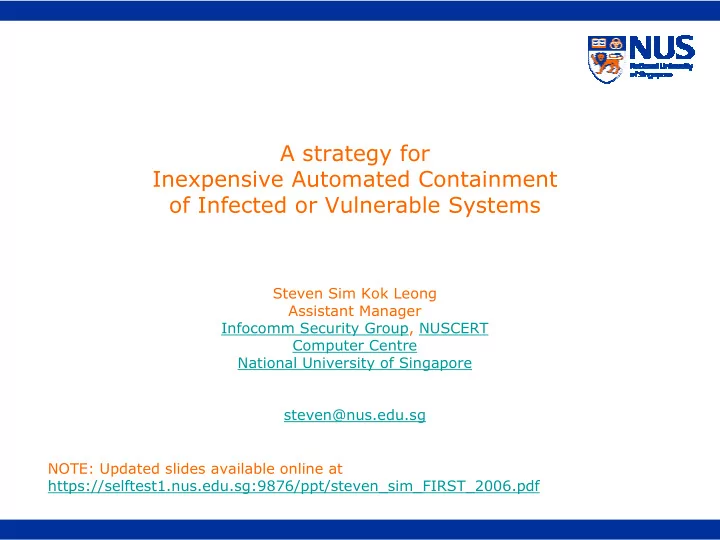

A strategy for Inexpensive Automated Containment of Infected or Vulnerable Systems Steven Sim Kok Leong Assistant Manager Infocomm Security Group, NUSCERT Computer Centre National University of Singapore steven@nus.edu.sg NOTE: Updated slides available online at https://selftest1.nus.edu.sg:9876/ppt/steven_sim_FIRST_2006.pdf
Agenda • NUS IT infrastructure • The awakening • A first step • Exploring alternatives • The evolution • Track record • What’s next? • Closing
The NUS IT infrastructure • Not-for-profit • Multi-gigabit, high speed network • 35,000 students and 6,000 staff • 30,000 concurrent online nodes • Plug-and-play networks • Wireless networks • Heterogeneous and diverse IT
The awakening • That blasted worm • Expensive and labor-intensive containment • Bottleneck in incident management • Need to process re-engineer – detection – containment – alert (response) – eradication (remediation)
A first step • Acceptable Use Policy – Legal counsel – IT steering committee – Student union • Detection: Statistical-based anomaly IDS – simple – low overheads – minimal false positives • Containment – switch-port disconnection • Alert (Response) – win-popup alerts • Eradication (Remediation) – users not easily reached
The evolution • The process Host switch-port manually disconnected by network team Blackhole Mechanism Statistical-anomaly IDS User gets alerted where possible through Windows messenging service User discovers network Helpdesk identifies and fixes User approaches helpdesk disconnection security issues Host switch port manually reactivated by network team Release Mechanism Helpdesk informs user his network connectivity is fixed
A first step • Limitations – a DoS attack on innocent users – require OOB to alert users – difficulty with remediation – tendency for user to change ports – manual and fairly labor-intensive
Exploring alternatives • Commercial containment products – route blackholing – admission control • Benefits – robust – efficient
Exploring alternatives • Limitations – costly • expensive ($$) • tremendous effort – overhaul of all unsupported switches • agent dependent – integration with detection feeds not available • lack of consideration for false negatives – in-house developed detection mechanisms
The evolution • Detection – statistical anomaly-based IDS – honeynets – vulnerability scanners • Containment – DHCP blackholing – internal intruders quarantined • botnet irc servers blocked • Alert (Response) – win-popup to infected machines – abuse contact of external origin auto-alerted • Eradication (Remediation) – self-help
The evolution • The process Host quarantined Statistical-anomaly IDS Blackhole Mechanism Honeynets User gets alerted where possible through email or Vulnerability Scanners Windows messenging service User accesses Internet websites User gets redirected to self-help User performs remedy including page self assessment Host gets released in next batch release Release Mechanism User gets alerted via email
Self - help
• Email on release
The evolution • Email alert to external abuse
The evolution • Beneficial features – cost and effort • cost of implementation • ease of implementation – user management • managing user expectations • empowering users – minimal false negatives • efficacy of current antivirus detection pattern can be determined • new antivirus-undetected malicious trojans, backdoors and worms can be discovered
The evolution • Limitations – does not handle non-DHCP based hosts • rely on switch-port disconnection – longer time window of infection/vulnerability • need to be improved upon – loopholes to circumvent DHCP blackhole and remediation steps • mitigated through monitoring of re- infections – self-help is Windows specific • eradication for other OS infections handled onsite.
Track record VIDS Detections 35000 30000 25000 No. of Intrusions 20000 15000 10000 5000 0 Jan '05 Feb '05 Mar '05 Apr '05 May '05 Jun '05 Jul '05 Aug '05 Sep '05 Oct '05 Nov '05 Dec '05 Month
Track record Honeynet Detections 1600 1400 1200 No. of internal intrusions 1000 Internal intrusions 800 Internal intruders 600 400 200 0 Aug '05 Sep '05 Oct '05 Nov '05 Dec '05 Month
Track record Blackholed/Quarantined systems 600 500 No. of quarantined MAC addresses 400 300 200 100 0 Jan '05 Feb '05 Mar '05 Apr '05 May '05 Jun '05 Jul '05 Aug '05 Sep '05 Oct '05 Nov '05 Dec '05 Month
Track record • Some signatures created that is based on discovered binaries in containment – TSPY_AGENT.AX - BKDR_NORUNORG.A – TSPY_AGENT.AK - BKDR_SERVU.AS – TROJ_DROPPER.GG - BKDR_SERVU.AZ – TROJ_SMALL.AHE - BKDR_HACDEF.AQ – TROJ_AGENT.XT - BKDR_SHELL.B – TROJ_AGENT.XU - WORM_NETSKY.DAM – TROJ_AGENT.XV - WORM_SOBER.DAM – WORM_RBOT.BWC - WORM_MYTOB.DAM – WORM_RBOT.BZC - WORM_LOVGATE.DAM – HKTL_PROCKILL.I - WORM_MYDOOM.DAM
What’s next? • Enhance containment for non-DHCP based systems – new server allowed on network after risk accessed and managed (this includes administrative, network and host vulnerability assessments) – existing server switch-port disconnected from network should any periodic network vulnerability assessment fail
Acknowledgements The development of the automated incident containment strategy would not be possible without the support and assistance from the following people: - Ms Yong Fong Lian (IT Security Manager) - Dr Ma Huijuan (IT Security Engineer) - Mr Gong Wei (IT Network Engineer)
Closing Containment strategy - Inexpensive - Simple - Easy to develop - Easy to implement - Easy to maintain - Effective
“The virus may be spreading despite the control measures already taken. Far more human and animal exposure to the virus will occur if strict containment does not isolate all known and unknown locations where the bird flu virus is currently present.” Dr Juan Lubroth
Recommend
More recommend